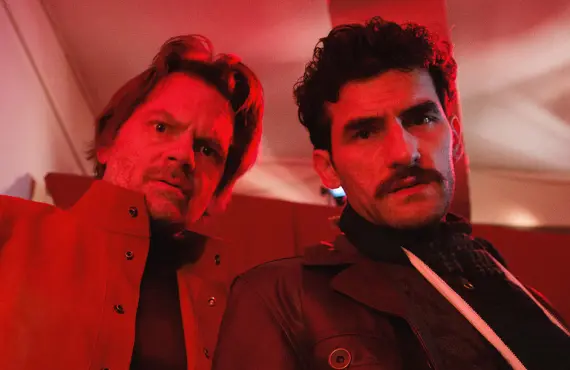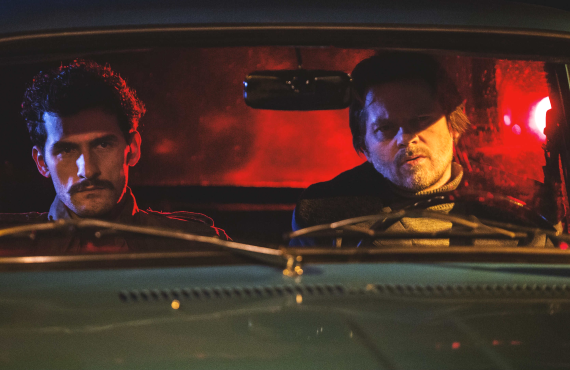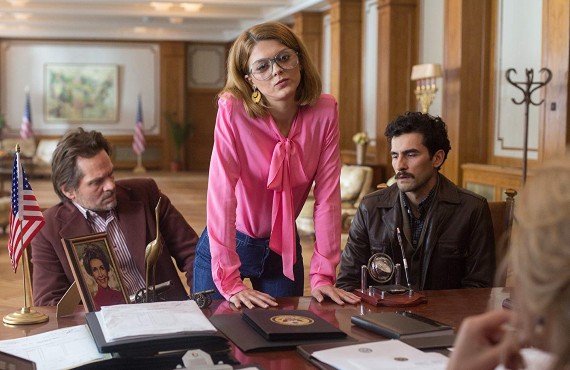Comrade Detective, The Greatest Romanian Buddy Cop Show That Never Was
-
 Florin Piersic Jr. and Corneliu Ulici star in Comrade Detective, with an assist from Channing Tatum and Joseph Gordon-Levitt (Amazon)
Florin Piersic Jr. and Corneliu Ulici star in Comrade Detective, with an assist from Channing Tatum and Joseph Gordon-Levitt (Amazon)Comrade Detective
Watch on AmazonIt’s the greatest Romanian TV show that never was. Tovarasul Militian — Comrade Detective in English — was 1980s Communist propaganda disguised as a buddy-cop action show. Created to reinforce anti-Western views among Romanians, Comrade Detective became an underground favorite among bourgeois directors like Stanley Kubrick. Thought to have vanished, all six episodes were recently unearthed and lovingly restored.
Well, that’s the story anyway, told with a straight face by Channing Tatum and journalist Jon Ronson from their seats in a screening room — all designed to give this miniseries the aura of a prestige foreign film.
In reality, Comrade Detective was a fake show made to look like late-Soviet-era arthouse. Before its premiere in 2017, its co-creators, Brian Gatewood and Allessandro Tanaka, described to interviewers how they were drawn to the idea by research on a little-known culture war between Hollywood and the Communist bloc during the Reagan years. While Americans were eating up movies with Russian bad guys and messages of freedom (think Rocky IV), just the opposite was happening on the other side of the Iron Curtain. There the movies featured greedy capitalist villains and dialogue that championed Marxist-Leninist ideals.
At first, Gatewood told Paste, he and Tanaka wanted to acquire one of these totalitarian relics, overdub it with English voices, and present it to Western audiences. But “we couldn’t get the rights to any of these shows,” so they created one from scratch instead.
Oh, c’mon. Why would anyone bother buying a TV show from the dying days of the Soviet empire? Much easier to build your own. But that’s Comrade Detective for you — even the “real” backstory is part of the tease.
Here’s what we know for sure. It was filmed in Romania with local actors delivering lines written in English that were then translated into Romanian. The episodes were later dubbed … in English … by the likes of Tatum, Nick Offerman, and Debra Winger. Got that?
The main story is easier to explain because it’s so boilerplate you already know it. There’s the streetwise detective Gregor (Florin Piersic Jr./voiced by Tatum), who does things his way, whether it’s by the book or not. After his partner is killed in the show’s opening minutes, Gregor goes on the hunt for his killer. And that’s when he gets the new partner who, of course, is his polar opposite — a rural cop named Iosif (Corneliu Ulici/Joseph Gordon-Levitt) who was boyhood friends with the deceased. They bond quickly, though, and are quickly branded as rogues by the rest of the squad, including their scowling captain, Covaci (Adrian Puduraru/Offerman).

In some ways Comrade Detective resembles the UK version of Life on Mars, another tribute to period-piece cop shows, only this one’s set in Bucharest to an Eastern bloc soundtrack and features a steady stream of warmed-over agitprop, delivered deadpan:
“Even the greatest health care system in the world can’t save him now.”
“Fighting capitalist propaganda is one of the state’s top priorities.”
“Whenever I get frustrated, I just think: What would Lenin do?"
The weirdness of Comrade Detective is personified by Covaci’s character. True to the genre, he keeps Gregor and Iosif on a short leash, but his character is also compelled to mouth the party line — e.g., “There’s no such thing as a corrupt cop in Romania!” — claptrap that’s pretty much undermined by the rest of the show.
I particularly enjoyed the half-buried humor, like the signs that read BASEBALL IS BORING at a protest scene outside the American embassy. Before a sting operation Covaci warns Gregor and Iosif, “If this thing goes south, I’ll knock your d—s in the dirt,” which kind of sounds like some mangled Transylvanian idiom … except that the line was originally written in English.
Comrade Detective earned high praise from The Guardian’s reviewer, who called it “astonishingly high-concept Amazon comedy.” Bustle’s critic praised it as “a wholly original series with a new take on recent history” and “a wacky idea that works surprisingly well.”
James Poniewozik took issue with that last observation. “Comrade Detective is so committed to the verisimilitude of a hamfisted propaganda drama — a killer wearing a Reagan mask is involved — that it often plays like one,” he wrote.
I see his point. But if Comrade Detective sounds intriguing to you, I think you’ll enjoy episodes 4-6. You won’t miss much skipping the first three episodes and the miniseries will be just as enjoyable in half the viewing time. If you spent much of the 1980s at your local multiplex, you might also want to watch the trope-heavy first episode. And I happen to think the second episode is worth it just for Iosif’s amazing “car wash” monologue. But … no pressure.
Afterwards, take a moment to ponder this question Malcolm Gladwell posed on his podcast: Does political satire do more harm than good? Gladwell’s point was that the repeated skewering of political figures like Margaret Thatcher and George H.W. Bush ironically served over time to make these figures lovable by exaggerating their worst features to comical, and thus endearing, effect. (Trump's best-known impersonator has wondered this too, though I don’t think he has anything to worry about.)

By extension Comrade Detective, with its over-the-top movie violence and cartoon cliches about capitalism and Communism, can be seen as trivializing, even romanticizing, the old East-West struggle by reducing it to a silly war of words. (For those of you who weren’t around in 1962, the U.S. and Russia came within hours of actual war involving nuclear weapons.)
I don’t think this criticism applies to Comrade Detective because, like most classic satire, it’s conservative at heart. A sendup of Communist “entertainment” (which was driven by statist rather than market imperatives), it consistently mocks anti-Americanism, not just the kind advanced by 1980s propagandists but by 21st-century intellectuals (e.g., Gregor bones up on U.S. history by reading “approved” texts that mention only racism and Indian genocide).
Throughout the show there are sly but unmistakable digs at the grim realities of life under Communism, as when Covaci grumbles at a crime scene, “There was a time when I’d line everyone here up against the wall and shoot them, just in the off chance they were the killer.” Pro-capitalist and pro-America, Comrade Detective still manages to be more weirdly subversive than anything you’ll see on late-night TV.
And that’s worth thinking about as America struggles to respond to a resurgent Russia. Vladimir Putin’s agents have figured out how to use Western media against the West, cherry-picking from our gusher of news and entertainment to create slick narratives about democracies as failed experiments — ugly, chaotic, ruled by criminals. One might say Putin is projecting. So far, though, he’s getting away with it.
We can keep responding to these shenanigans with sanctions and official condemnations, and we should. But maybe we should try a little mockery, too.
Aaron Barnhart has written about television since 1994, including 15 years as TV critic for the Kansas City Star.
TOPICS: Channing Tatum, Prime Video, Comrade Detective
- How to watch Roofman online? Streaming options explained
- “It was the biggest mistake”: Channing Tatum opens up about regretting decision to turn down ‘Beauty and the Beast’ role
- Who's Who in the Voice Cast of America: The Motion Picture
- HBO Max orders a Magic Mike reality competition produced by Channing Tatum and Steven Soderbergh